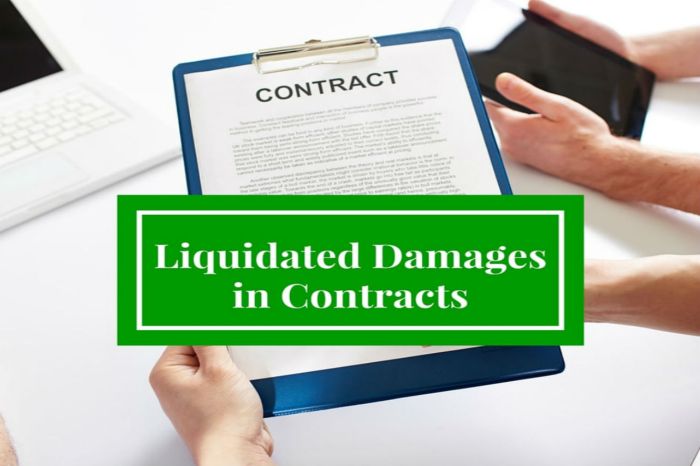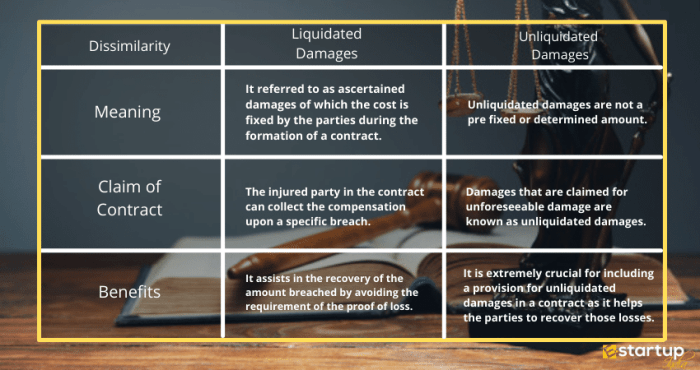Liquidated damages provisions normally are unenforceable – Liquidated damages provisions, commonly included in contracts to predetermine damages in the event of a breach, are often unenforceable. This article explores the principle of unenforceability, its exceptions, and the consequences of having an unenforceable provision.
The discussion delves into the rationale behind the unenforceability principle, emphasizing the need for certainty and fairness in contract law. It also examines the exceptions to this rule, such as when damages are difficult to ascertain or when the provision is reasonable.
Unenforceability of Liquidated Damages Provisions

Liquidated damages provisions are contractual clauses that specify a predetermined amount of damages to be paid in the event of a breach of contract. These provisions are often used in commercial contracts to provide certainty and predictability regarding the consequences of breach.
However, liquidated damages provisions are not always enforceable, and courts may refuse to uphold them under certain circumstances.
Reasons for Unenforceability
The general principle of unenforceability of liquidated damages provisions is based on the need for certainty and fairness in contract law. Courts are reluctant to enforce liquidated damages provisions that are:
- Unreasonably large or disproportionate to the actual damages likely to be incurred.
- Unfairly one-sided, benefiting one party at the expense of the other.
- Imprecise or ambiguous, leaving room for uncertainty or dispute.
Exceptions to the Unenforceability Rule
Despite the general principle of unenforceability, there are exceptions to the rule. Liquidated damages provisions may be upheld if:
- The actual damages are difficult or impossible to ascertain with certainty.
- The provision is reasonable in light of the anticipated damages and the purpose of the contract.
- The parties have negotiated the provision in good faith and with full knowledge of the potential consequences.
Examples of situations where liquidated damages provisions have been upheld include:
- Contracts for the sale of goods, where the market price of the goods may fluctuate significantly.
- Contracts for construction projects, where the cost of delays can be difficult to estimate.
- Contracts for the provision of services, where the value of the services may be difficult to quantify.
Drafting Enforceable Liquidated Damages Provisions
To increase the likelihood of a liquidated damages provision being upheld by a court, it is essential to draft it carefully. Key elements of an enforceable provision include:
- Specificity:The provision should clearly state the amount of damages to be paid and the specific circumstances that trigger the payment.
- Reasonableness:The amount of damages should be reasonable in relation to the potential actual damages.
- Proportionality:The damages should be proportionate to the severity of the breach.
Guidance on drafting enforceable provisions includes:
- Use clear and concise language.
- Avoid using vague or ambiguous terms.
- Consider seeking legal advice to ensure the provision is drafted in accordance with applicable laws and regulations.
Consequences of Unenforceable Liquidated Damages Provisions
If a liquidated damages provision is deemed unenforceable by a court, the consequences can include:
- The non-breaching party may be limited to seeking actual damages, which can be difficult or impossible to prove.
- The court may award damages based on its own assessment of the actual damages incurred.
- The parties may be left with an uncertain and potentially costly dispute.
Alternatives to Liquidated Damages Provisions, Liquidated damages provisions normally are unenforceable
In some cases, liquidated damages provisions may not be appropriate or feasible. Alternative methods for addressing potential damages in contracts include:
- Penalty clauses:Penalty clauses provide for a specific amount of damages to be paid in the event of a breach, regardless of the actual damages incurred. However, penalty clauses are generally disfavored by courts and may be unenforceable if they are deemed to be excessive or unreasonable.
- Specific performance:Specific performance is a legal remedy that requires the breaching party to fulfill their contractual obligations. This remedy is only available if the subject matter of the contract is unique or difficult to replace.
The choice of which method to use to address potential damages in a contract depends on the specific circumstances and the objectives of the parties.
FAQs: Liquidated Damages Provisions Normally Are Unenforceable
Why are liquidated damages provisions generally unenforceable?
Liquidated damages provisions are generally unenforceable to prevent parties from circumventing the principle of compensatory damages, which requires that damages awarded in a breach of contract case be proportionate to the actual loss suffered.
What are the exceptions to the unenforceability rule?
Exceptions to the unenforceability rule include situations where damages are difficult to ascertain or where the provision is reasonable, meaning it represents a genuine estimate of the likely damages that would result from a breach.
What are the consequences of having an unenforceable liquidated damages provision?
Having an unenforceable liquidated damages provision can lead to the provision being disregarded by the court and the non-breaching party being limited to recovering actual damages, which may be difficult to prove and may not fully compensate for the losses incurred.

